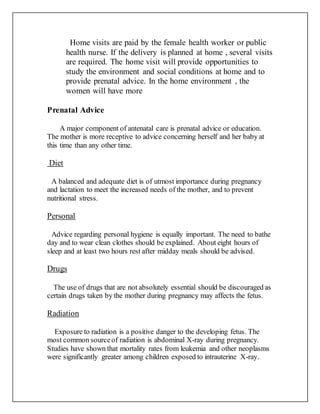Preventive obstetrics is the practice of taking proactive measures to ensure the health and wellbeing of mothers and their newborns during pregnancy, childbirth, and the postpartum period. This includes identifying and addressing potential risks or complications that may arise, as well as promoting healthy habits and behaviors that can help to prevent problems from occurring in the first place.
One important aspect of preventive obstetrics is preconception care, which involves taking steps to optimize a woman's health before she becomes pregnant. This can involve making lifestyle changes such as quitting smoking, avoiding alcohol and certain medications, and getting vaccinated against certain infections. It can also involve managing chronic health conditions, such as diabetes or epilepsy, to ensure that they are well-controlled before pregnancy. Preconception care can help to reduce the risk of complications such as preterm birth, low birth weight, and birth defects.
During pregnancy, preventive obstetrics involves regular check-ups and screenings to monitor the health of both the mother and the fetus. These may include blood tests, urine tests, and imaging techniques such as ultrasound. This can help to identify any potential risks or complications, such as gestational diabetes or preterm labor, so that they can be managed effectively.
Preventive obstetrics also involves educating expectant mothers about healthy habits and behaviors that can promote the health of both themselves and their newborns. This includes things like getting enough rest, staying hydrated, eating a healthy and balanced diet, and getting regular exercise. It may also involve avoiding certain activities or exposures that could be harmful to the pregnancy, such as smoking or using certain medications.
Another important aspect of preventive obstetrics is the management of labor and delivery. This can involve making decisions about the best place to give birth, such as at home, in a birthing center, or in a hospital. It may also involve choosing the most appropriate method of delivery, such as vaginal delivery or cesarean section, based on the mother's health and the needs of the fetus.
Finally, preventive obstetrics includes postpartum care, which involves supporting the mother and newborn as they adjust to life outside the womb. This can involve things like providing guidance on breastfeeding, helping the mother to manage postpartum mood disorders, and providing support for the physical and emotional challenges of caring for a newborn.
Overall, preventive obstetrics plays a vital role in ensuring the health and wellbeing of mothers and their newborns. By taking proactive measures to identify and address potential risks and complications, and by promoting healthy habits and behaviors, obstetricians and other healthcare professionals can help to ensure that mothers and their newborns have the best possible outcomes.






